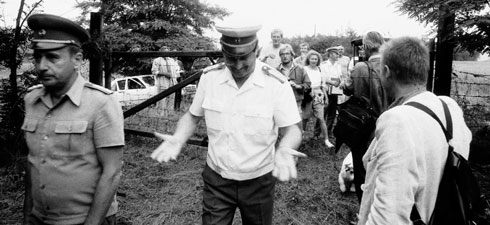"Let us remember!" headlines[Magyar Hírlap](http://www.magyarhirlap.hu/cikk.php?cikk=176041) to celebrate the 20th anniversary of this “milestone of European memory”. The Hungarian daily quotes German chancellor Angela Merkel, who is expected to attend the festivities in Sopron alongside Swedish foreign minister Carl Bildt, declaring that “Germany will always be grateful to the Hungarian people for showing such providential courage without asking for anything in return.” Many of the 600-odd ex-East Germans who took advantage of the short-lived border opening to reach the West are also expected to show up, adds Magyar Hírlap: “The Germans see the pan-European picnic as the key event which led to unification. They will feel right at home there because the town’s traffic and street signs are in both Hungarian and German.”
“A pan-European picnic made the Iron Curtain fall [sic],” writes the Romanian daily Adevarul, for its part. That day Budapest “tested Moscow”, although, the editorial points out, the opening was not only ideologically motivated: “The financial reasons were negligible, seeing as the Hungarians had to periodically renew 246 kilometres of barbed wire, which was a very expensive operation indeed!” The “sausages-and-beer” barbecue was to trigger what is still known today as “the Great East German Exodus”, adds Adevarul: from that day on, over 50,000 East Germans were to flee to the West before the Wall finally fell that 9 November.
“Nothing was planned in advance,” Der Standard has it from Walburga Habsburg Douglas, who helped her father, Otto von Habsburg, to organise that monumental picnic. The Viennese daily explains that it was Otto who had made contact with the Hungarian government. Walburga herself had pamphlets distributed all the way to the Hungarian Lake Balaton, the East Germans’ holiday resort of choice: “They were waiting for something to happen. They wanted the picnic as a symbol to show that Hungary was part of Europe. When I saw the people running, I thought that might be the beginning of something big.”
The Süddeutsche Zeitung in Munich, profiles the “hero of the day”: Sub-colonel Árpad Bella, in charge of the checkpoint on the Hungarian border: the “border guard who was no longer willing to play prison warden and who let the refugees through the already fragile enclosure”. However, notesThe Times of London, Bella cursed his fate that day in 1989: “Curiously, or perhaps not, his superiors were absent that day. The commander of the border guards was on holiday in the Soviet Union and his deputy was nowhere to be found.” He recounts to the Süddeutsche Zeitung, “I knew I was probably going to prison for months, years even.” But "his pragmatism got the better of him: he let them go”, and the paper adds that it was Bella who persuaded his Austrian counterparts not to block those who were fleeing from Hungary.
In fact, writes the Spanish dailyABC, “they let them escape” because for several months the word from the Hungarian government has been “laissez faire”, albeit not without tacit approval from Moscow. Budapest “was thereby breaking with the Communist countries’ official line, much to the dismay of GDR leader Erich Honecker”. To back up this side of the story, ABC cites the Hungarian prime minister at the time, Miklos Nemeth: “It was a matter of verifying whether Mikhail Gorbachev had told me the truth in March, or whether the Soviet Union would react by ordering the troops based in our country to intervene.”
Was this article useful? If so we are delighted!
It is freely available because we believe that the right to free and independent information is essential for democracy. But this right is not guaranteed forever, and independence comes at a cost. We need your support in order to continue publishing independent, multilingual news for all Europeans.
Discover our subscription offers and their exclusive benefits and become a member of our community now!












